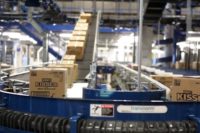Unbeknowst to me at the time, the restaurant where Ulrich Zuenelli, managing director of A. Loacker AG/Spa, and I were breaking bread, was home to many a clandestine meeting during World War II.Only the most powerful and well-connected knew the password, "Vogele," to gain entry to secret meetings during the conflict.
And while neither Zuenelli or I had need of a password to gain entry to this historic restaurant in Bolzano, Italy — now appropriately named Vogele — the information exchanged during the interview was as valuable as any passed on in the 1940s.
In between clinking glasses, clanging silverware and raucous conversations within the vaulted Gewolbestube room, Zuenelli detailed the company's near- and long-term strategies for continued growth.
Last year, sales for the Auna di Sott, Italy-based wafer and chocolate specialties company reached nearly €270 million ($351 million), about a 10 percent jump from 2011. Since 2005, the company has increased its tonnage by 80 percent, the 46-year-old chairman explains.
"We forecasting continued growth in volume and are optimistic that the expansion trend will continue for the company," he explains. That said, the current and projected growth poses a capacity challenge for the company.
This, despite the fact that the company doubled the size of both its manufacturing facilities three ago, investing more than €80 million its Auna di Sotto as well as its Heinfels, Austria plants.
But thanks to a disciplined growth plan, one that focuses on "innovation, internationalization and integration," it's time to once again reinvest. Consistent double-digit growth gains in sales, coupled with a successful foray into premium specialty products, such as chocolate snack bars and pralines, has resulted in the need for a third production facility.
Although 70 percent of the company's volume remains wafer-based, the launch of innovative, chocolate-enrobed items such as Tortina, Fogliette, Gran Pasticceria and Rose of the Dolomites — all wafer-based, indulgent treats in various milk and dark chocolate varieties — has opened up a range of opportunities in Italy and abroad.
Zuenelli attributes internationalization as a key component in fostering Loacker's growth.
"More than two-thirds of our volume is sold abroad, and more than 50 percent of our total volume is outside Europe," he adds. The Middle East represents nearly half of that volume, with Asia and the United States accounting for 22 and 7 percent, respectively. Last year, exports grew 18 percent.
Although sales in Italy remained flat, Zuenelli explains that the fact the company was able to hold its own in the motherland represents a significant accomplishment.
"Italy is in bad shape; we've experienced the deepest recession since World War II," he says. "Disposable income has dropped significantly. We're hopeful that the change in leadership will address the severe economic problems the nation faces."
Despite those difficulties, Loacker has been able to defend its home turf, retaining dominant market leadership in wafers, and leading shares in the premium chocolate-enrobed specialty cookie segment. In addition, the company — almost in a stealth-like manner — managed to become the number four player, behind Ferrero, Mars and Nestle, in the chocolate snack bar segment with a 5 percent share.
"We're looking to export that idea as well," adds Zuenelli.
The continued double-digit expansion of exports and the projected, albeit slow, economic recovery in Italy, necessitated the board's hand in addressing capacity issues for the company.
"The board approved building a third plant adjacent to the Heinfels facility," he explains. The €70-million investment will create a second 20,000-sq.-meter production facility adjacent to the existing one. Immediate plans call for two wafer lines and two chocolate enrobing lines, as well as future installation of chocolate moulding lines. An aggressive completion date of fall 2015 has been set.
"We chose the Heinfels site for a variety of reasons," he continues. "First, we had land available there. Second, the basic resources were also there, such as water, air and climate, which are all important ingredients for our company."
"In addition, the two plants will generate synergies," Zuenelli says."Another consideration was the labor market, which allows us to find highly skilled and motivated people."
The plant investment, however, only represents one element of the company's commitment to future growth; Loacker looks to build up its presence in certain markets, moving it out of "a niche position and into the mainstream."
This customized marketing plan will identify the most attractive opportunities within the 100 countries that Loacker exports to, allowing it to develop specific strategies "that will speed up the market penetration process," he says.
For example, the U.S. market, which enjoyed a 10 percent jump in sales last year, is under consideration for such an injection of funds. The management team is weighing the decision to create a U.S. subsidiary, Loacker USA , which would allow the company to sell directly to retailers.
"We believe it would bring added value to retailers if they could talk directly to the principal of the brand," Zuenelli says.It also would streamline logistics and hopefully expand distribution.
These so-called "superfunds" would also allow the company to amplify marketing efforts in areas that hold significant potential for growth, such as Latin and South America as well as Asia Pacific.
Another element involving future investment by the company centers on its moccarias or retail shops, which it introduced five years ago.Currently Loacker operates four retail units throughout the South and East Tyrol regions (northeastern Italy and southeastern Austria). It is seriously looking at franchising the concept abroad.
The Locker moccaria, which is a uniquely Italian hybrid of a coffee shop, pasticceria (pastry shop) and retail outlet, offers consumers pastries, coffee and a limited cafe menu consisting of sandwiches and pasta. Most importantly, the Loacker moccarias provide consumers an opportunity to review and purchase the entire Loacker product line, a critical tool in further integrating the brand amongst consumers.
"No retail store would give us this much space on the shelf to show all 190 SKUs," says Zuenelli.
The ability to showcase the entire product line provides ample sales opportunities for cafe visitors and shoppers alike. Foodservice and retail sales ratios vary depending upon the store. Even so, retail sales reached as high as 80 percent in some locations. Annual sales at the company's newest location on Bolzano's main square topped $2 million in the first year.
"We first wanted to attain a critical mass with the retail business so we could better understand the business," Zuenelli says. "This allowed us to streamline and optimize the business. We're currently undergoing a validation stage with a retail expert, which should identify the potential for future growth through franchising."
Once the validation has been complete, the company will again review potential investors in key markets that are interested in establishing a Loacker moccaria cafe. It's all part of the plan to deliver "pure pleasure" to consumers.
Zuenelli's goal is that consumers connect the password, "Loacker" with that very thought.









